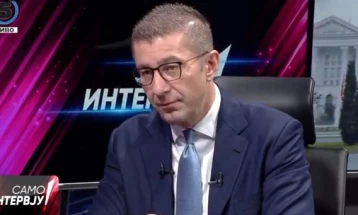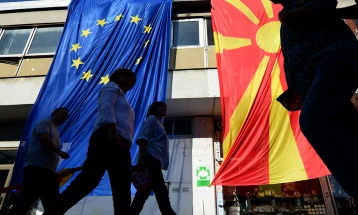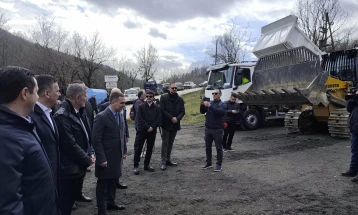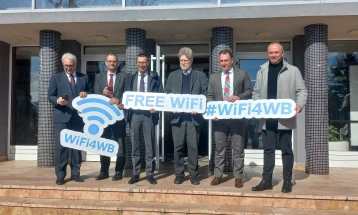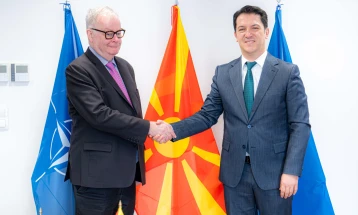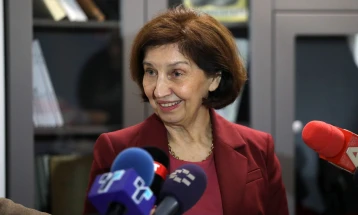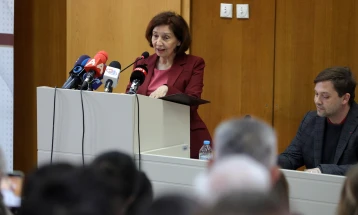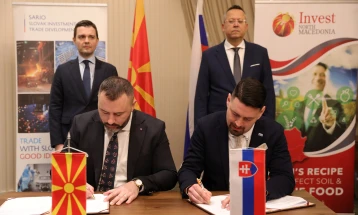PFD 2022 Session “The European Peace Project in the Western Balkans”: Without Western Balkans the EU remains an unfinished business
- Post By Nevenka Nikolik
- 18:22, 16 June, 2022
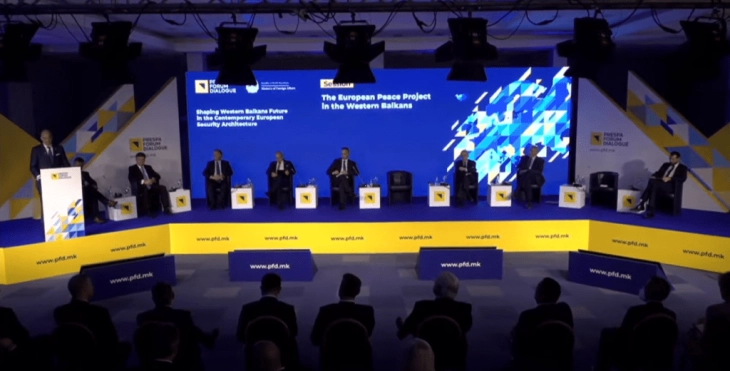
Ohrid, 16 June 2022 (MIA) – In the dispute with Bulgaria we are doing everything to align our positions and unblock our integration path through new friendship, said First Deputy PM and Minister of Political System and Inter-Community Relations Artan Grubi, delivering a keynote address at the opening of a session on “The European Peace Project in the Western Balkans” as part of the Prespa Forum Dialogue 2022 in Ohrid on Thursday.
“We are not tired, we are not desperate, we won’t give up, on the contrary we are motivated to overcome the last obstacle and together with the Western Balkan neighbors to see ourselves anchored in the EU. But this must be done with dignity, fully respecting the identity, cultural and language definitions of our Macedonian fellow citizens. It cannot be done differently,” said Grubi.
According to him, today’s forum is held in key circumstances, in the last days of the bilateral dialogue, which is again facilitated by the country’s supporters.
“North Macedonia, this success story, is the common responsibility of all of us, here at home, in the neighborhood, the region, the European Union and the United States, and we must take the final step together, with dignity,” said Grubi.
The Greek Foreign Minister in his address pointed out that there are indeed success stories in the Balkans, and one of them is the relations between Greece and North Macedonia, adding that it is impossible to imagine Europe without its Southeastern region.
“Southeast Europe in general and the Western Balkans in particular have always belonged to Europe. Like other parts of the Continent, the Western Balkans have experienced armed conflicts, that is known. But, geographically, historically, culturally they belong to Europe. The war in Ukraine highlighted the strategic importance of the European Union – Western Balkans relationship,” said Dendias, noting that the EU remains an unfinished business 19 years after the 2003 Thessaloniki Agenda.
“The EU and the Western Balkans should do their own share in this respect. Our partners need to fulfill the relevant criteria according to the set conditionality. But, also, the EU needs to get the enlargement in the Western Balkans back on track and very quickly. Greece is doing its utmost to contribute to this collective effort,” Dendias added.
He reiterated Greek Prime Minister Kyriakos Mitsotakis’ statement on June 10 "In accordance with set criteria, let us offer the potential of completing the integration of all of the Western Balkans into the EU by 2033 - an ambitious but absolutely achievable timeline.” In addition, Dendias expressed a word of caution regarding the presence of third parties in the region.
Croatia’s Foreign Minister Gordan Grlić Radman stressed support for North Macedonia’s European perspective, as Croatia has proven during its 2020 EU Presidency. He stressed that EU enlargement with the Western Balkans remains of vital importance, adding that is is very important that North Macedonia becomes part of the European family.
“The status quo in EU enlargement has remained for quite long. The war in Ukraine changed the conditions and now a new strategy for the future of the region is needed,” said Grlić Radman.
Commenting on French President Emmanuel Macron’s idea on a European geopolitical community, Alain LeRoy underlined it is not about an alternative to EU membership or a substitute for the enlargement process.
“We at France are working so hard with our friends to start the negotiation process both for North Macedonia and Albania,” he added among other.
The EU’s Special Representative for the region Miroslav Lajčák stressed that the Russian aggression has undermined the pillars of the global architecture, but in terms of the region, the war has shown that there’s no time of self-sufficiency and the region cannot stay between two realities.
“Russia’s aggression against Ukraine has made the enlargement political again, and it created a momentum for speeding up the enlargement process,” said Lajčák.
Bulgarian MEP and EP Rapporteur for North Macedonia, Ilhan Kyuchyuk, pointed out that engagement between the European institutions and North Macedonia and Albania is very strong, and it will continue because it is of great importance.
“The status quo in EU enlargement is lose-lose situation. For the EU because it loses its credibility in terms of foreign policy and geopolitically, and it is also loss for North Macedonia and its citizens because I’m convinced that the citizens of North Macedonia deserve an open Euro-Atlantic path, because the country is commited and delivers concrete results,” said Kyuchyuk.
